How I Teach Writing to My Teen With Dysgraphia
Learning how to write well is one of the important life skills for teens to master, but it’s not a simple task for everyone.
My son has dysgraphia, a learning disability that affects writing. Here are tools he has used to help overcome dysgraphia and succeed with the increased writing demands he is facing.
For as long as he can remember my son has struggled with the writing part of our language arts lessons. I’m not just talking about “writer’s block” or difficulties deciding what to write about. He has a hard time with the physical act of writing and getting his thoughts on paper.
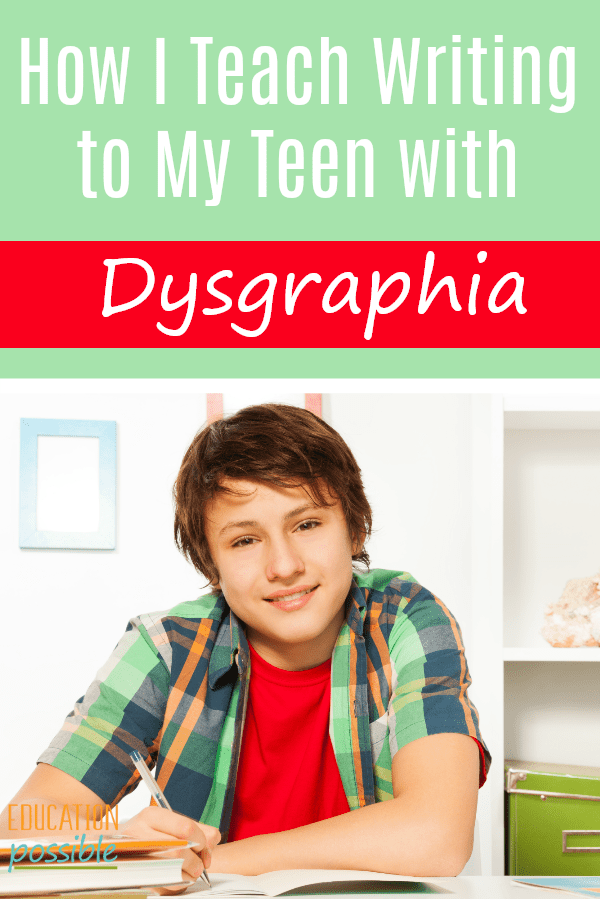
This post contains affiliate links.
Previously I shared some suggestions for how I was teaching writing to my child with dysgraphia. As my son has moved into the teen years people continue to ask me for updates on his progress.
The writing requirements for middle and high school are even greater than the earlier grades and we have had to continue to look for additional remediation, modification, and accommodation approaches.
Please remember that every child is different, and some of these suggestions may not work for other teens, but this is how I teach writing to my teen with dysgraphia.
What is Dysgraphia?
When my son was younger he would get frustrated about his writing issues. He didn’t understand why he couldn’t get his ideas on paper, why he couldn’t read his own writing, and why everyone else could fill in the answers on their papers so much faster.
Now that my son is older we have been working together to research dysgraphia. A few of our favorite websites for information include the National Center for Learning Disabilities (ncld.org) and Understood.org.
He can now read articles and understand the characteristics of this learning disability that impact his life. At this point he feels like he has a greater understanding of how his brain processes information. Writing is still challenging for him, but he knows now what the characteristics of dysgraphia are and how his approach to writing is different than others.
As my son has begun to take more classes outside of the homeschool environment he can now explain his writing situation to his peers and instructors. Making them aware of his situation has opened the door to additional understanding and assistance that he can use as he works to complete his assignments.
Writing Mechanics
There are many aspects of writing that are difficult for my teen with dysgraphia. We are still aware of the need for some remediation, especially in the areas of spelling and grammar.
By the time many kids enter the middle school years, it becomes a little easier to edit their own writing assignments to check for spelling and grammar errors. Although we tried several curricula focused on developing editing skills, they didn’t work for my son. It’s pretty common that people with dysgraphia find it hard to identify errors in written work.
We have opted to continue with basic spelling, vocabulary, and grammar curriculum such as Spell Well, Vocabulary from Classical Roots, and Easy Grammar Ultimate Series (180 Daily Teaching Lessons). These products have helped us to review these concepts a little at a time on a continuous basis.
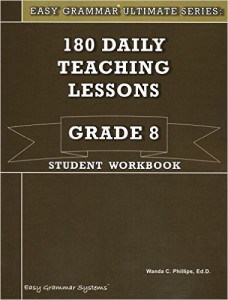
Another reason we use this curriculum is to encourage my son to write short, specific pieces of information. His handwriting is still not very legible, but he understands the importance of practicing his handwriting on a regular basis. It is less frustrating to write answers to short, fill-in-the-blank type questions than to try to write well thought out paragraphs. To complete longer writing assignments he uses a word processing software program.
Gather and Express Ideas
For a long time, my son was frustrated with the idea of having to write a multi-paragraph or multi-page paper. Dysgraphia often makes it challenging for people to get their thoughts out and onto paper.
To help address this issue we looked for creative ways to help him collect and share his thoughts with others. Two of the most helpful activities have been our teen book club and a homeschool Speech and Debate class.
Our Book Club members have been meeting together for many years. Since starting a book club, our children have not only read a number of classic books, but they have also had opportunities to associate great books with hands-on learning and unique writing activities. Rather than just asking our students to respond to essay questions, we try to incorporate fun writing activities into our club.
For example – when we read The Red Badge of Courage, our kids were given a choice to either rewrite a scene from another character’s perspective or write about an object utilizing realistic descriptions (a technique the author used). By offering two options, my son could select a topic that was most interesting for him. Both writing options were short and offered flexibility with structure, which gave my son a chance to focus more on the information he wanted to share than the specific style elements of a formal essay.
This is my son’s second year of participating in Speech and Debate and I have to say it has been one of the most beneficial classes of all! My son has never been shy or afraid to speak in front of others, but he did have a hard time gathering and organizing his thoughts and ideas. Through this course, he has learned the various elements of a strong speech, which he has come to think of as a “formula” for collecting ideas.
By creating a “template” for sharing information about his topic he now finds it easier to gather information, document it in an effective format, and edit it in a way to add emphasis. This process has helped him understand the overall process of forming ideas, writing them on paper, and then sharing them verbally with others. Although the writing process still takes a great deal of time, he is at least excited about the topic and he looks forward to putting in the hard work for a solid final result.
Writing Practice
Middle and high school work include a lot of writing practice. It’s not just busywork; it is preparing students for life beyond high school.
We have been gradually moving from writing strong one-paragraph essays to five-paragraph essays, and on to multi-page papers. This process has taken longer for my son because of his dysgraphia BUT as he is getting older he has a better understanding of why writing is so important – he sees this is a skill he will need and use for the rest of his life.
I want my son to develop practical and effective writing skills so we have found, and now use, two solid curriculums that given him both flexibility and structure as he continues to grow and strengthen in his writing practice.
Our go-to program for teaching middle and high school level writing is Writing Rockstars. I still can’t say enough about how much this personalized writing instruction program has helped our family. The approach of this program is to equip students with the tools they need to share their ideas and write effective essays. The five steps students learn include brainstorming, organization, free draft, revision, and editing.
My son finds this process helpful because there is a greater focus on helping students clarify their ideas and get them out and onto paper than other programs we have tried.
With Fortuigence, he has brainstorming and organizing tools to help him gather his thoughts before he is required to work through the details of structure and editing (grammar, punctuation, spelling, etc.) his multi-page essay.
My son loves to study history so I decided to use his favorite subject as a tool to help with writing practice. We have been using materials from the Classical Historian for our world history studies this year and (I can’t believe I’m writing this…) my son is now looking forward to writing 5-paragraph papers! The Classical Historian challenges students to learn the skills of a historian – to research, analyze, and discuss different perspectives. This curriculum helps students systematically learn how to evaluate and share their opinions both verbally and in writing.
Between the topics covered and the tools offered this program helps my son gather his ideas and express them clearly and effectively. The helpful pre-writing assignments make the essay development process move smoothly from draft to final product.
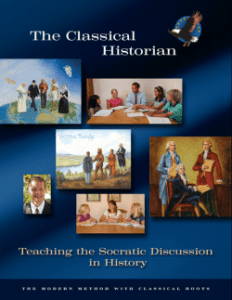
As we move through the high school years my son still faces many writing challenges, but at least he is making continual progress and not always dreading his writing assignments.
As I mentioned at the beginning of this post, every student is different so I can’t guarantee your child will experience the same results with any of these suggestions, but I’m happy to share ideas that might be helpful.
Resources that Helped my Teen with Dysgraphia with Writing
- Classical Historian World History Studies
- Easy Grammar Ultimate Series (180 Daily Teaching Lessons)
- Fortuigence Essay Rockstar
- Spell Well
- Vocabulary from Classical Roots
A fun way to build your teen’s vocabulary and spelling skills is to play some of these word games. Many of them require writing, and most will make kids think quickly. The more you work with words, the more comfortable your child will become.
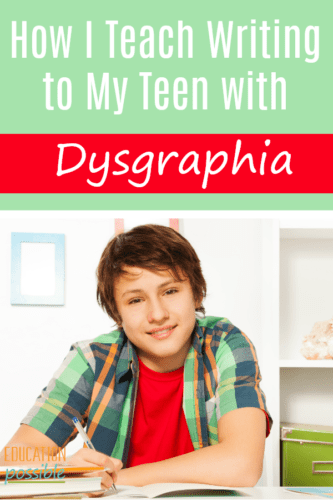
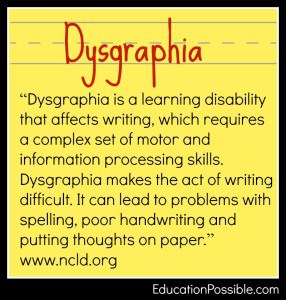
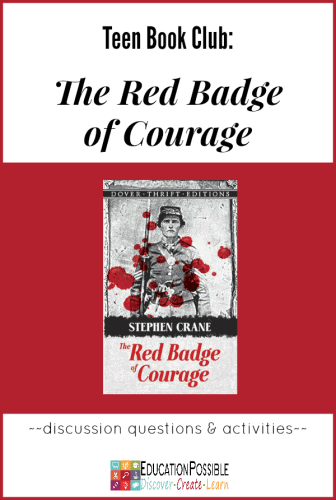

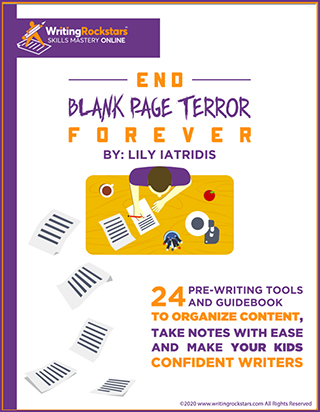
Thank you for this post. My son is 10, diagnosed with dysgraphia and visual processing disorder and finishing 5th grade in public school where I am a 4th grade teacher. His intellect is near the average 14 yr. old or higher. He reads on Fountas and Pinnell level Z. We will be pulling him out of school at the end of this year and will be homeschooling next year, because the school is unable to meet his needs and I will no longer be able to oversee potential problems as he goes to middle school. I have been looking for what to use for curriculum for him, because I know I can’t just get any old writing program for him. I linked to your older email when your son was nearer my sons age to see your suggestions there. I had already checked wordsmith, so its on the short list. I am curious if you have any experience with Brave Writer her son has dysgraphia, Write Shop, EIW, All About Spelling, and Growing With Grammar. I have found all of these in many hours of searching for writing curriculum for students with dysgraphia. Any help you can give is most appreciated.
Hi Robin, We decided to homeschool for the same reasons, the schools told me when my son was young that they didn’t think they would be able to support him as he worked at his own pace. Homeschooling isn’t always easy, but it does offer the flexibility to find options that can work. We used IEW for a couple of years for the middle school years and my son did like the structure of it. I often wrote his responses on a white board and he took his time to copy the work and make necessary edits. I have heard good things about Brave Writer and All About Spelling but don’t have personal experience with them. What I have found during my many years in the homeschool world is that many of the curriculum/programs widely used by homeschoolers (like those you have mentioned) are written and supported by families who have experience with children with learning challenges such as dysgraphia. I would encourage you to explore the websites for the products you are considering and then contact them directly with your questions. You will be pleasantly surprised – in many cases you might be able to talk to the curriculum author directly! I would love to hear what materials you find that work best for your son so we can share your information with others too!
Thank you so much for your thoughts. Once we’ve decided and had some time in them I will definitely share my thoughts on each we are using. Right now what we will do will be not be intensive since I have to help him get rid of the “I hate writing/I hate school mentality.”
How has your homeschooling gone with your son? Where you were at the time you wrote this is where I am now. My son will be going in 6th grade- has difficulty writing and def has the “I hate school/I hate writing” mentality.What has worked for you?
Thanks for any advice you could email me.
Thankyou so much. My son was diagnosed only last year. He has just stared High school and we are facing an uphill battle. I find that there is a lot of information about other learning difficulties but not this one. I will try fortuigence and see how that goes. He particularly hates persuasive writing, his spelling is quite good weirdly so, but his grammar is very bad. I will also get the book you said to and see what happens.
I highly recommend contacting Lily, the teacher of the Fortuigence writing courses (you can contact her via the website). Before my children ever started her courses I discussed my son’s dysgraphia so she was aware of the situation. She is a very supportive teacher — she gives terrific feedback and encourages the kids to work at their own pace. She has years of experience working with teens and is very gracious with her time.
This is great! Thank you so much for sharing what is working for you. We are struggling with composing anything longer than a single sentence. My son is in 6th grade and I’m not sure whether to go to a back to basics grammar program or something more focused on composition. Do you have any suggestions?
Hi Laina, When my son was at that age we decided to focus on helping him get his ideas out. He struggled with the mechanics (grammar, sentence structure, etc.) so we looked for tools to allowed him to focus on forming and expressing his thoughts. We used some brainstorming tools and often I would be his scribe and write down what he shared verbally. Usually he would then take the information I wrote and would try to re-write it on his own – it took time but he understood how important the process was. I really struggled with the idea that he (like your son) couldn’t compose a single sentence, but I tried to keep the bigger picture in mind as I knew the real goal of writing was to be able to share his ideas and opinions. I didn’t want him to get completely frustrated and think that because he struggled with the mechanics his ideas were not going to get the attention they deserved. He has always been very creative and thoughtful and we allowed him see that we could help him capture those big ideas and slowly but surely work on the mechanics. My son still struggles with spelling (we are very thankful for spell check!) and grammar but over time he has made improvements. It’s a long road, and more challenging than most kids have to face, but a slow and steady mindset is important. I guess I would suggest keeping the big picture in mind – the ultimate goal is to help kids clearly express themselves with their writing. Focus on the mechanics slowly but surely (repeating curriculum if needed or switching to something your child dislikes a little less), be their scribe as needed, have them practice writing with meaningful projects like thank you notes or shopping lists (grow into larger projects over time), and acknowledge your child’s frustrations (some days will be very difficult, so take a breath and try again the next day).
I was wondering when you said about speech and debate, what are these classes? Are they school run or do you do it yourself . I think if I can get him to organise his thoughts etc that this will be invaluable as he will be able to speech to text to its full potential.
My children take a speech and debate class through a local homeschool co-op. If you want to find a speech and debate group in your area you might be able to find recommendations by visiting the websites for NCFCA or STOA.
If you would like to work on these skills at home you might want to check out the Speech Bootcamp materials available from IEW http://iew.com/shop/products/speech-boot-camp-teachers-notes-trainee-materials-clearance
Thanks Susan
Unfortunately for us here in country Australia there is not one. But thankyou for the link and I will definitely get hold of Lily
Thankyou again
Jo
Has anyone used this :
http://www.wvced.com/writing-tutor-pack/
William Van Cleav Writing Matters. I was thinking of looking into it –but as parents already know other parents advice is fantastic.